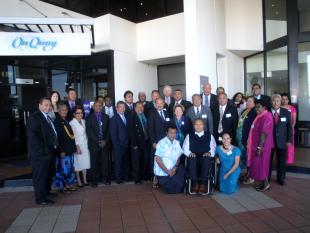Winds of change: parliamentarians mobilize to end violence against women
Date:

Legal reforms can transform women's lives when they are implemented and properly utilized. Gender-based violence is a fundamental violation of women's rights and affects all countries. Legal reforms can address this pandemic, but what is needed are strong laws, active implementation and services for women's protection and prevention of violence against women.
Globally, 139 constitutions include guarantees of gender equality, 125 countries outlaw domestic violence. Yet the rule of law often rules women out, and the implementation of laws lag behind.
Nearly 69 per cent of women in the Pacific Region are reported to have experienced physical or sexual violence in their lifetime. Last month lawmakers at the Pacific Islands Forum met to address this challenge. Coming from 8 Pacific Island states, they drew up a commitment requesting national authorities to produce and strengthen statistical records on incidences and types of violence against women, children and those with disabilities.
They also urged governments, the private sector and partners in the region to contribute to this effort.
Countries in the Pacific are using the latest data to inform legislative and policy change, with draft legislation under development in several. Some countries among them, such as Kiribati and the Solomon Islands, have developed national action plans to take concerted action on the issue, and development partners are supporting the implementation of these in partnership with governments.
Even in developed countries, violence against women is widespread. The National Council to Reduce Violence against Women and Their Children of Australia estimates such violence costs the country 13.6 billion dollars each year. In more than 95 percent of domestic assaults the husband was the perpetrator.
The strong message from the Pacific Island lawmakers reflects the increasing political will and momentum in a region that has the highest documented rates of violence against women in the world. But this promising start is just a start, it needs firm action and legislative steps put in place for implementation. UN Women, is supporting national plans for gender equality within legal frameworks to bring justice to the most vulnerable, namely women and children.
Recently on her Latin American tour UN Women's Executive Director Michelle Bachelet took part in presenting a national plan in Colombia. In Costa Rica, she applauded the country's moves to increase women's involvement in government and the progress it has made in equalizing the gender gap UN Women also partners with the Inter-Parliamentary Union (IPU) and other organizations to not only advocate for legal reforms that parliamentarians can initiate, but also to increase women parliamentarians worldwide.
Experts say a critical mass is needed to move legislation, and currently the average percentage of women in parliaments, is just 20 per cent, far from the 30 percent that is considered essential. Nordic countries have the highest average - with 43 per cent in some countries.
But the winds of change are certainly blowing, and parliaments across the world are addressing the pandemic of violence against women. Some concrete steps in recent years include: In Togo, a comprehensive bill providing prevention, protection and assistance to victims is currently being debated in parliament.
According to Christine Mensah, President of the Commission on Human Rights of the National Assembly of Togo, ‘'The law on violence against women will now be applied because the magistrates, judges, police officers have participated in its elaboration alongside civil society and traditional leaders''.
In the Maldives, the parliament, supported by IPU, worked on a draft bill on domestic violence for two years, which was passed in April 2012. For the first time in the country, legal protection is provided to victims of domestic abuse. In Burundi, in July 2012 meetings were planned engaging up to 100 people from the Burundian Parliament to discuss the creation of a law against gender based violence. According to IPU research, in one Burundian sexual violence Crisis Centre 68 per cent are minors and 17 per cent are under the age of five.
In Guatemala, for the first time in March 2010, a tribunal was held focusing on indigenous women's access to justice where women spoke out about the violence they faced during the civil war. It started the ongoing debates about impunity, reparations, social justice and violence against women in Guatemala.
Sexual violence against women was widespread during Guatemala's 33 year conflict and impunity for these crimes is absolute, given that not a single case has ever come to court. Along with governments, civil society and UN partner organization, UN Women is working to ensure legal reforms and their accelerated implementation becomes the norm globally.